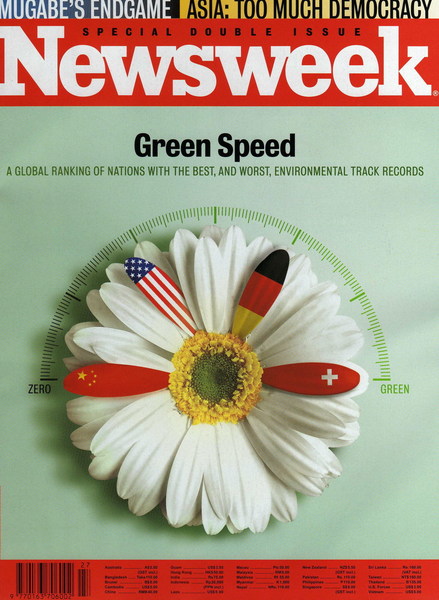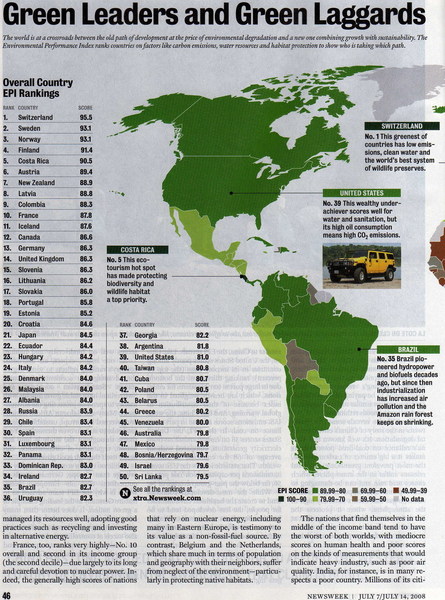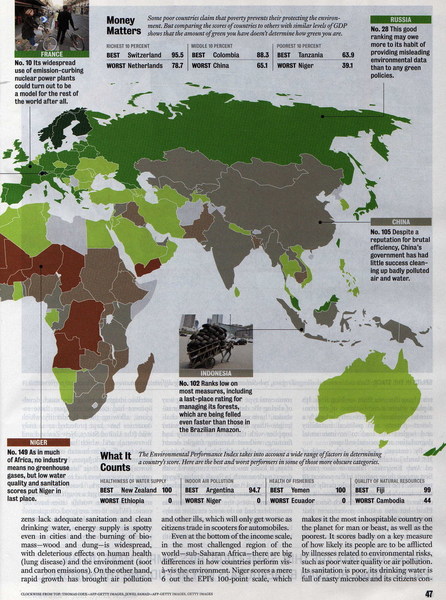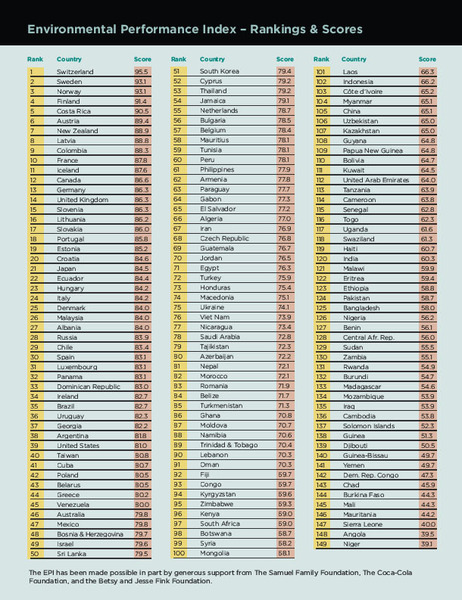
Newsweek以顏色標出不同等級的綠色程度。


詳細排名與週刊摘要報導請點繼續閱讀。

(Overall EPI Rankings, Copyright Yale)
Newsweek Website Summary
original: http://www.shvoong.com/social-sciences/economics/1825570-http-www-newsweek-com-id/
Summary by : B N Goyal
Jointly produced by Yale's Center for Law & Environmental Policy and Columbia's Center for International Earth Science Information Network, EPI aims to be a comprehensive assessment of the world's environmental challenges and how individual countries are responding to them.
It was Franklin Roosvelt who felt concerned about how to track imminent environmental disasters.He asked economist Simon Kuznets to come up with a broad, standardized accounting system, now known as the gross national product, the universal measure of national economic performance.
Though the EPI is still nowhere near as accurate a measure of national performance as GNP, still, it is the best measure we have of how nations are faring in the battle to save the environment, and the findings are striking.
China in particular has long argued that it is too poor to afford the Western luxury of environmental awareness. The EPI exposes this claim to be bogus. China ranks last among 15 nations in its income group (the fifth decile), behind Vietnam. The EPI exposes this claim to be bogus. China ranks last
The United States is remarkably similar to Chinas.The United States scores poorly among countries in its income class (the top 10 percent), ranking third from the bottom. The U.S. score in emissions per capita, which Yale puts at 56, far below the peer-group average of 74.
While the most-developed countries tend to create the healthiest environments for people, the less developed tend to be healthier for plants and animals. Wealthy nations can afford cleaner technologies, but development takes a toll on the environment. Less developed countries often lack both dirty industries and clean drinking water. Spain gets high marks for sanitation; Tanzania scores well on biodiversity and habitat.
An individual country's ranking reflects to some degree the advantages or accidents of circumstance. Scandinavian countries and Switzerland have stable governments with money to spend on protecting the environment. Many sub-Saharan African nations are governed by corrupt, unstable regimes too broke to sustain even themselves.
Yet a theme in the study is how any nation can better itself through good governance.Germany tends to outperform even its European peer. It does better in regulating pesticides and managing agricultural use of water. It also excels at controlling carbon emissions and maintaining high water quality and low levels of soot in its cities. France, too, ranks very high y- No. 10 overall and second in its income group (the second decile)—due largely to its long and careful devotion to nuclear power. Belgium and the Netherlands, which share much in terms of population and geography with their neighbors, suffer from neglect of the environment—particularly in protecting native habitats.
India is in many respects a poor country. Millions of its citizens lack adequate sanitation and clean drinking water, energy supply is spotty even in cities and the burning of biomass—wood and dung—is widespread, with deleterious effects on human health (lung disease) and the environment (soot and carbon emissions). On the other hand, rapid growth has brought air pollution and other ills, which will only get worse as citizens trade in scooters for automobiles.
Niger scores a mere 6 out the EPI's 100-point scale, which makes it the most inhospitable country on the planet for man or beast, as well as the poorest. Its sanitation is poor, its drinking water is full of nasty microbes and its citizens contract lung diseases from cooking fires. Tanzania, with a rank of 113, lands just ahead of the far-richer United Arab Emirates. Tanzania also ranks first among those nations in the poorest 10 percent. The reason has to do partly with the country's biological inheritance—it includes much of the wildlife-rich Serengeti Plain—but also a stable government that has guided development and controlled poaching and pollution.
Although Israel doesn't score well compared with countries in its wealth class, it looks much better compared with desert nations such as Saudi Arabia, Egypt and the United Arab Emirates, which have more severe water problems.
In some cases, the Yale and Columbia researchers had to do some creative analysis. To assess how well countries are protecting biodiversity, they overlaid a map of national parks and other wildlife areas with satellite images showing how much development had encroached upon these regions.
Among the best industrial countries were Malaysia, the United Kingdom and all of Eastern Europe (a legacy of the Soviet nuclear program). Among the worst offenders were Japan, South Korea, Brazil, the United States, Italy and Paraguay.
Where the data are thin, one reason is simple: embarrassment. Some countries simply lie or make up the facts. This was common practice among Soviet apparatchiks who, year after year, somehow always seemed to reach the industrial and environmental goals set forth by the Kremlin.
Brazil high rank—34th—is deceptive. It is a vast land blessed with an abundance of water, which yields energy relatively cheaply with no carbon emissions.
One clear conclusion from the project is the need for better data. Acquiring high-quality data, especially in the developing world, is difficult. If we're going to avoid squandering our natural resources, the quicker we begin to rely more on facts and less on assumptions, the better.


 留言列表
留言列表
